by JEFF LUNDENBERGER ~ Posted June 24th, 2016
I recently watched the 1954 version of “A Star Is Born” and the 1972 film “Cabaret” just a few days apart from one another and discovered a connection I’d never noticed before, beyond any similarities that might be obvious. They’re both musicals, of course, but musicals in which, for the most part, the songs are presented as performances. Characters sing and dance in nightclubs, on stages, in films – No one bursts into song in a cornfield or on the streets of New York City. “A Star Is Born” stars one of the most dynamic performers the world of film has known: JUDY GARLAND. “Cabaret” stars her daughter, easily mocked but almost equally talented: LIZA MINNELLI. Both have elements of humor, romance, and tragedy. But this time, seeing them so near to one another, it suddenly occurred to me that they both contain scenes that terrify me. Maybe terrify is too strong a word. They each contain a scene that unsettles me, one by exposing emotional truth, one by mining historical truths; two scenes I find disturbing yet beautiful, chilling but timeless. They’re vivid examples of the power and effectiveness of the movies.
“Cabaret” (directed by Bob Fosse) is one of my favorite movies (though that might not be saying much as my favorites list is long and ever-growing!). And what a thrill it was to see it at the TCM Classic Film Festival in 2012, with Joel Grey, Michael York, and Liza Minnelli there to introduce it, a real festival high-point for me. I’ve been trying to watch more movie musicals over the past few years as I’d never been much of a fan of that genre. But I somehow don’t consider “Cabaret” a musical, so integrated into the story are the songs performed at the seedy Kit Kat Klub as a reflection of the plot that progresses from innocence ~ [ stardom-seeking cabaret singer Sally Bowles (Liza) and subdued academic Brian Roberts (Michael York) ] ~ to experience, as the two have a taste of the decadence and danger surrounding them in pre-World War II Berlin.
musicals over the past few years as I’d never been much of a fan of that genre. But I somehow don’t consider “Cabaret” a musical, so integrated into the story are the songs performed at the seedy Kit Kat Klub as a reflection of the plot that progresses from innocence ~ [ stardom-seeking cabaret singer Sally Bowles (Liza) and subdued academic Brian Roberts (Michael York) ] ~ to experience, as the two have a taste of the decadence and danger surrounding them in pre-World War II Berlin.
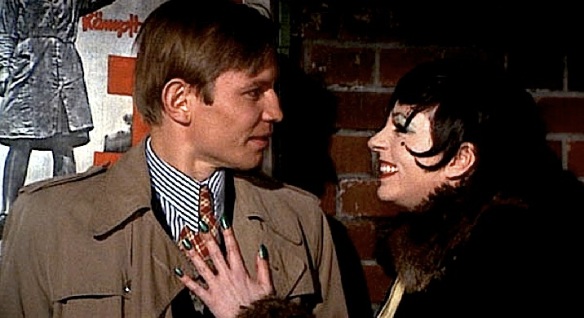
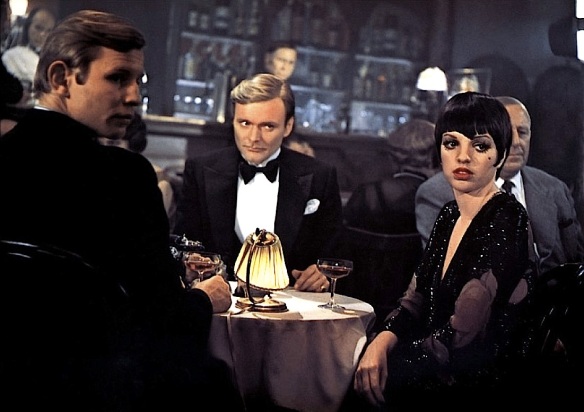
Brian and Sally share a room in a boarding house and develop a casual sexual companionship, Sally being mainly focused on Sally, and Brian not exclusively hetero-sexual. At one point Brian and Max (Helmut Griem), the pair’s shared lover, have a break from Sally and visit a country beer garden. It’s a sunny day and as the two toast to an African trip that won’t come to be, a beautiful blonde teenage boy begins to sing…the melody hypnotic, the lyrics seemingly as innocent as the boy…
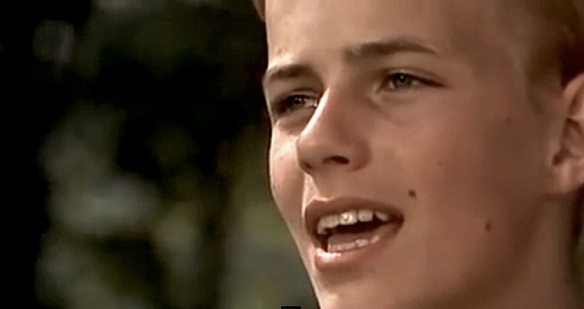
“The sun on the meadow is summery warm.
The stag in the forest runs free.
But gather together to greet the storm.
Tomorrow belongs to me.”
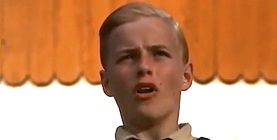
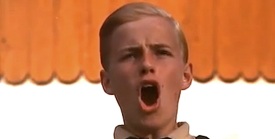
…Until the camera pans down to reveal the child’s brown shirt and swastika armband. Still, the song is irresistible and invites us to sing along and indeed, one by one, other patrons, young and old, join in as we realize that the song isn’t as innocent as we thought. It
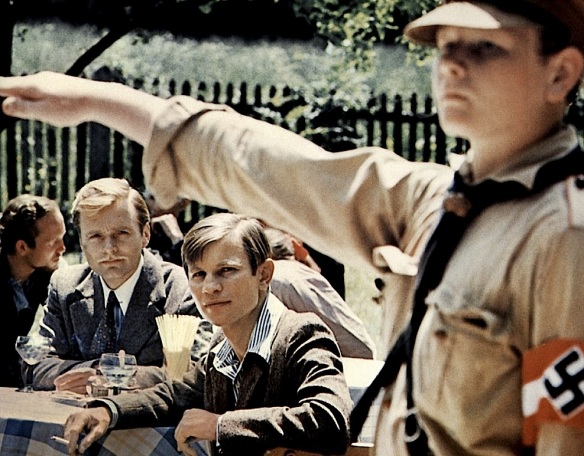
becomes more insistent, more strident, no longer an invitation but a command; those singing not a chorus but an army spitting an anthem, ending with a Nazi salute and a cut to a wicked smile from the emcee of the Kit Kat Klub, nowhere near, but omnipotent the personification of the dark side of human nature. This is how it begins, the slow, steady process of the naturalization of evil and a comfort with a world of hatred and fear, the final product being the final solution.
The simultaneous beauty and depravity of the scene brings a tear to my eye whenever I watch it, a stunning, truthful scene in a near-perfect movie. Horrified, I woke up singing the song the next morning.
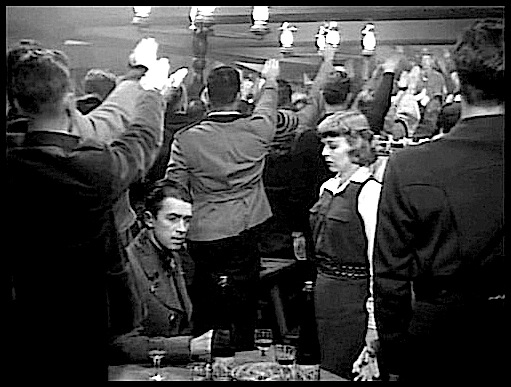
(In the process of writing this piece I happened to watch the film “The Mortal Storm,” a fine film about the rise of Nazism and its effects on the personal lives of those not so taken with its principles. There are great performances by all, including a heartbreaking turn by Frank Morgan. It, too, has a scene in a beer hall with a Nazi anthem and suspicion is thrown on those not joining in. I won’t say that one film is better than the other, but I do think that the difficult, troubling transcendence of the “Cabaret” scene is hard to beat.)
♦ ♦ ♦ ♦ ♦ ♦ ♦
If someone were to ask me who my favorite actor is, Judy Garland wouldn’t be the first name that would come to mind, but really – with that enormous voice and that bottomless need – when she’s on the screen I just can’t take my eyes off her. She devotes everything she has to every moment of screen time and her performance in “A Star Is Born” (directed by George Cukor) is a prime example of her power and vulnerability.
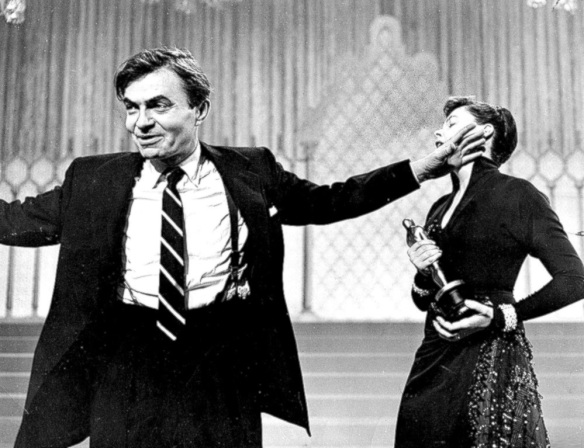
Judy plays Vicki Lester, a young star on the rise. Norman Maine (James Mason) is her mentor and husband, a famous film actor, whose career’s on the wane due to his alcoholism. The movie expands and contracts visually, from big, wide spaces…the chaos of a film opening, to a dark, after-hours nightclub. We go from over-sized musical production numbers to the tender intimacy of an overheard marriage proposal made in the middle of a busy soundstage. One number, “Lose That Long Face,” appears as if it were in the process of being filmed. The set is period city streets in grey, the costumes grey too, except for the red jacket worn by Vicki, and bits of red and pink on the two children she dances with. She’s selling newspapers, in a straw hat and freckles and, after a brief, man-made rain shower, she sings to the extras:
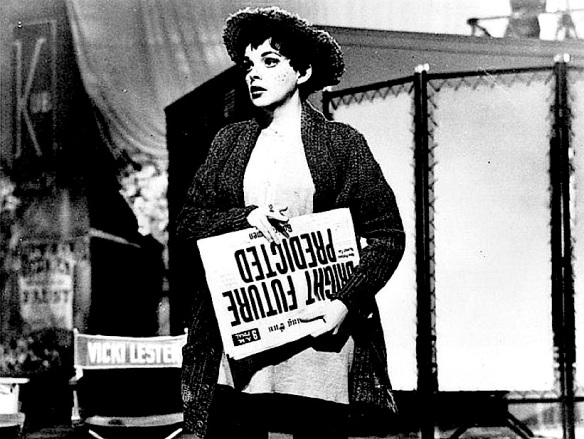
If as, and when you’ve got a long face
Rearrange it
Don’t be contented with the wrong face
There’s a way to change it…
Go lose that long face, that long face
Go ‘long and get that long face lost.
Vicki sings solo while tap dancing in and around the other dancers and then CUT! Vicki retires to her dressing room and has a conversation with studio head Oliver Niles (Charles Bickford).
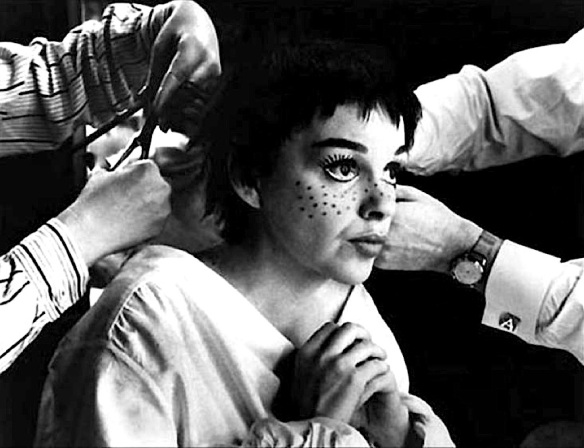
What to do about Norman? His drinking. His disappearances. She loves him. She hates him. Oliver will find a role for Norman. Vicki is comforted, dries her tears, applies fresh freckles to her cheeks, returns to the set, finds her mark, the music is cued, and ACTION! She’s ON, singing her song about the power of a smile to dispel the blues; in a split second, back at least visibly, to the spirit of the number and Vicki’s suddenly cured of her long face.
[ H O M E ]
_________________________________________________________________________
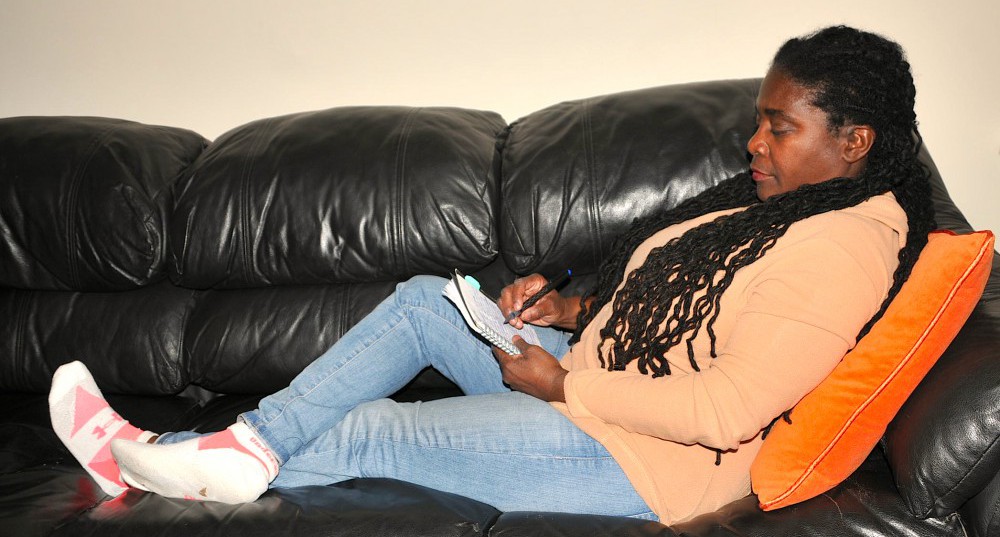
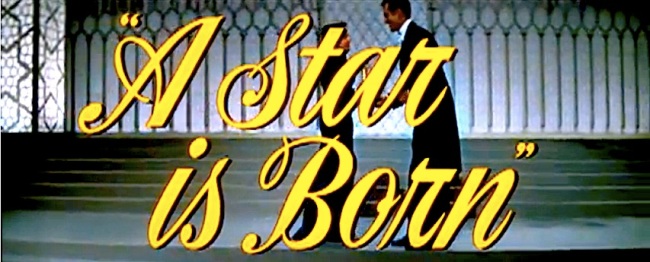
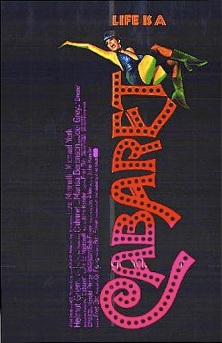
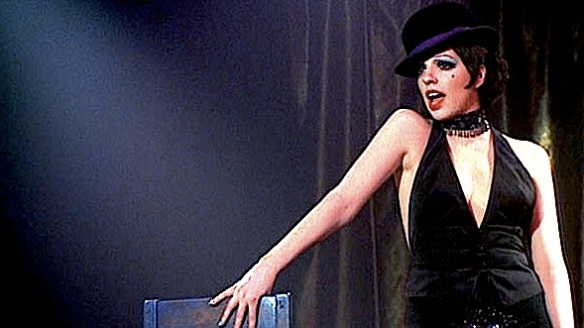
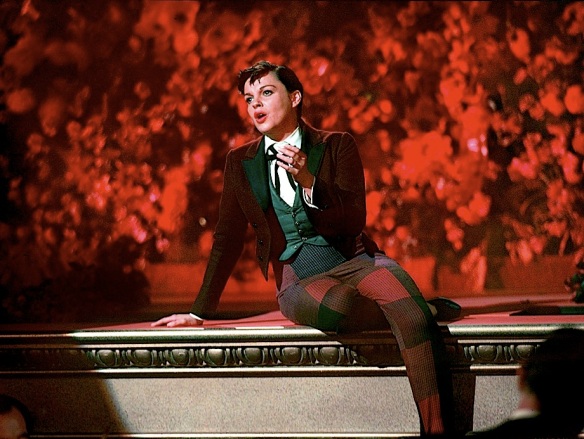
Does anyone know the names of the two black children who tap dance with Judy in ” lose that long face?”
LikeLiked by 1 person
Good question.I wonder who they are.
LikeLike
I’m trying to find the answer to that question too. It was an amazing dance number. Imagine the courage to cast those two
Talented children who happened to be black in 1954.
LikeLike
The little girl is Patricia Rosemond.
LikeLike
The little boy is Bobby Sailes. I have been trying to find info about them . All I could find was that Bobby was on the Red Skeleton Show. Thanks for the girl’s name.
LikeLike